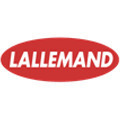 Lallemand Animal Nutrition confirmed its commitment to swine research and in particular its focus on sow nutrition in peri-partum, with two innovative studies presented at the latest ‘Journées de la Recherche Porcine’ (swine research days) in Paris, a major event for the pig industry to stay abreast of swine research. The first study showed the benefits of antioxidant combination (including the SOD rich melon concentrate MELOFEED® and organic selenium yeast ALKOSEL®) in sow diet on piglet maturity at birth. The other study presented by David Guillou, Swine R&D Manager with Lallemand Animal Nutrition, looked at potential role of digestive endotoxins on Mastitis Metritis Agalactia (MMA) in sows, and the benefits of live yeast LEVUCELL® SB on the reduction of this syndrome by securing the digestive process. This study indicates that endotoxins in piglets are not inevitable and that sow to piglet endotoxin transfer can be limited.
Lallemand Animal Nutrition confirmed its commitment to swine research and in particular its focus on sow nutrition in peri-partum, with two innovative studies presented at the latest ‘Journées de la Recherche Porcine’ (swine research days) in Paris, a major event for the pig industry to stay abreast of swine research. The first study showed the benefits of antioxidant combination (including the SOD rich melon concentrate MELOFEED® and organic selenium yeast ALKOSEL®) in sow diet on piglet maturity at birth. The other study presented by David Guillou, Swine R&D Manager with Lallemand Animal Nutrition, looked at potential role of digestive endotoxins on Mastitis Metritis Agalactia (MMA) in sows, and the benefits of live yeast LEVUCELL® SB on the reduction of this syndrome by securing the digestive process. This study indicates that endotoxins in piglets are not inevitable and that sow to piglet endotoxin transfer can be limited.Antioxidant combination containing MELOFEED and ALKOSEL to fight piglet immaturity.
Three years ago, Lallemand Animal Nutrition presented its first study on piglet immaturity at birth, a growing concern in pig farms as sows prolificacy and thus litter heterogeneity have soared. This study enabled to design a piglet maturity scoring system aimed at assessing this problem in an objective manner. This helped confirm the reality of the presence of immature piglets within large litters. Scientists reckon that this immaturity is determined at early stage of the gestation, since the first days of pregnancy, when the embryo is submitted to important oxidative stress.
A trial was conducted to study the effects on piglets of the supplementation of sow diet during the weaning-estrus interval with an antioxidant complex. Antioxidant protection is naturally ensured by different complementary pathways involving enzymatic systems and neutralising molecules. The supplement used combined primary (Superoxide dismutase and catalase from MELOFEED®, bioavailable Selenium from ALKOSEL®) and secondary (Vitamin E, Vitamin C) antioxidants for optimal protection. Altogether, the maturity of 924 piglets, from control and treated sows, was recorded at birth, based on morphological and behavioural criteria.
It was shown that the supply of the antioxidants to the sow during the weaning to estrus interval significantly reduced both the percentage of immature piglets per litter (8.8% vs. 21.1%, P < 0.05) and the intra-litter heterogeneity in terms of piglet weight at birth.
This study also confirms the very early determination of piglet immaturity, in the very first days of fecundation and before (estrus is a period of high oxidative stress).
Role of digestive endotoxins in MMA and the potential of LEVUCELL® SB to reduce MMA frequency
In sows, the release of endotoxins in the digestive tract has been suggested to play a role in postpartum dysgalactia syndrome (PDS), a mild form of Mastitis Metritis Agalactia (MMA). Our own field observations indicate that live yeast supplementation in peri-partal sows could reduce the incidence of PDS.
In order to verify this additional benefit of S. boulardii CNCM I-1079 (LEVUCELL® SB) and gain a better understanding of the fate of bacterial endotoxins from the sow gastro‐intestinal tract to its bloodstream and their potential transfer to the piglet, a trial was conducted in a farm with chronic PDS incidence. The trial started three weeks before expected parturition. PDS symptoms were evaluated twice daily and endotoxins were measured in the sows faeces, blood and colostrum/milk, and then in piglet blood.
This study showed that LEVUCELL® SB could help reduce PDS incidence:
- The incidence of clinical signs of PDS (rectal temperature; neonatal diarrhea) tended to decrease with LEVUCELL® SB treatment as compared to control (P=0.09).
- The colostral endotoxins level tended to be reduced with LEVUCELL® SB, as well as plasma levels towards the end of lactation.
- A positive correlation was found between colostrum endotoxin levels and clinical signs of PDS.
- LEVUCELL®SB modulated the LPS binding protein in sow blood.
- Finally, a positive correlation was also found between sow colostrum contamination and piglets blood endotoxin contents.
March 5, 2013 - Lallemand Animal Nutrition



